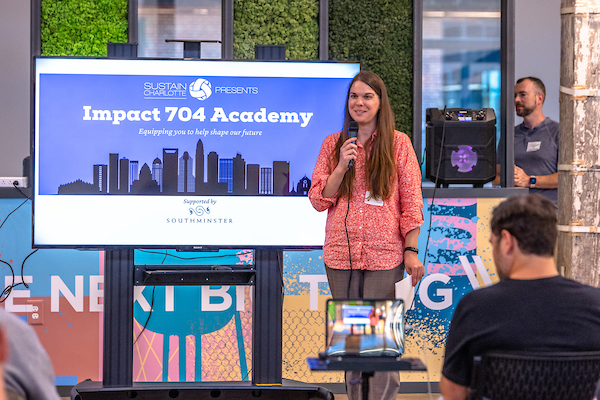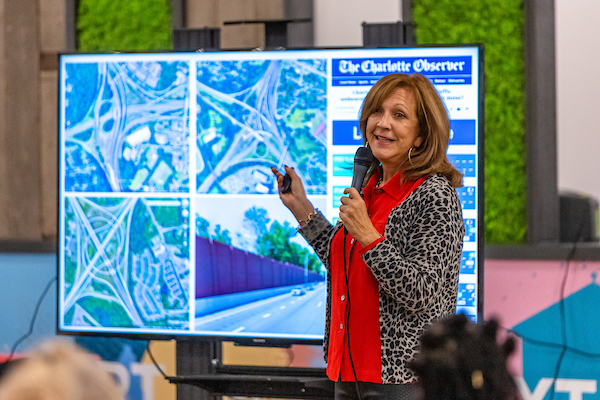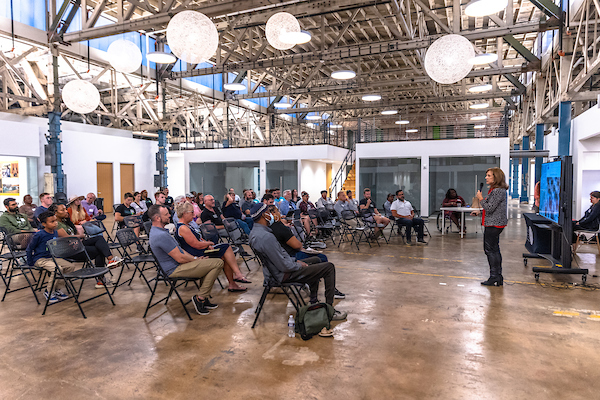Impact 704 Academy debuts with a primer on smart growth
Sustain Charlotte’s Impact 704 Academy, an educational series about sustainable, equitable, and resilient urban development in the Charlotte area, kicked off on Oct. 6 at Camp North End with an introduction to the concept of smart growth and why it matters.
Nearly 50 people gathered for refreshments and a presentation that featured Meg Fencil, Sustain Charlotte’s director of impact and engagement, and Deborah Ryan, professor of Architecture and Urban Design at UNC Charlotte.
Meg talked about the 10 principles of smart growth and why we need to start thinking about the implementation of those in the Charlotte area as soon as possible to address the swiftly growing population in our area now and in the decades to come.
Smart growth is all about sustainability, she explained, and sustainability is about the ability to meet our needs today without compromising the ability to meet our needs in the future. The smart growth principles Meg shared include:
- Mixed land-uses
- Taking advantage of compact design
- Creating a range of housing opportunities and choices
- Creating walkable neighborhoods
- Fostering distinctive, attractive communities with a distinct sense of place
- Preserving open space, farmland, natural beauty, and critical environmental areas
- Directing development toward existing communities
- Providing a variety of transportation choices
- Making development decisions predictable, fair, and cost-effective
- Encouraging community and stakeholder collaboration in development decisions
Next, Ryan talked about the concept of a “slow city,” sharing examples of large cities across the globe that have embraced the concept, which posits that congestion is actually good for a number of reasons.
She noted that without traffic congestion, there’s less incentive for many of the smart growth principles to be implemented. While American cities are built with efficiency and speed in mind, they are often isolating and lack choices. Congestion makes people slow down to allow new forms of development and lifestyles to occur.
“Congestion is good, Ryan shared. “Vibrancy happens. Slowed-down traffic also means a safer environment for pedestrians and cyclists.”
She noted South End as an example of a congested-yet-vibrant area in Charlotte.
To wrap up the evening, attendees participated in a group exercise facilitated by Meg. They were encouraged to identify smart growth barriers and opportunities in their community, reflect on the transportation choices in their neighborhoods, and consider factors like how many destinations they can reach without driving a car and how long their typical workday commute is. This personal reflection and community conversation provided an opportunity to think about what it would mean to become an advocate for a safe, healthy, equitable place to live, work and play for all.
The Impact 704 Academy series continues on Nov. 10 and Dec. 15 and will focus on transportation and land use. Each session includes presentations with speakers representing the city government, educational institutions, nonprofits, and the private sector. Attendees learn how to advocate for themselves and their communities.
Everyone who attends all three sessions (or attends two in-person and watches one online and submits a short summary) and completes a Take Action! mini-project will earn an academy completion certificate.
Make plans now to attend the next session in November — and bring friends! Register here.
Thanks for reading!
We are so grateful to Southminster for their generous support of the academy. As a nonprofit, community support is essential for us to keep doing what we do — including providing free articles like this. If you found this article helpful, please consider supporting Sustain Charlotte so we can continue advocating for a better future and working with residents, neighborhood organizations, government agencies, nonprofits, and businesses to solve the most critical challenges to Charlotte’s long-term social, economic, and environmental health.
Want to stay in the loop? Subscribe to our free, weekly newsletter and follow us on Twitter, Facebook, and Instagram.




